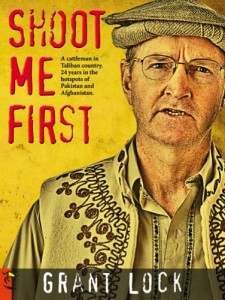Review: Shoot Me First
 It takes a special book to capture my imagination. There are plenty of books that stimulate my thinking or tickle me with trivia. The occasional epic novel moves me with allegory, symbolism, and a decent hit of adrenaline. But these are nothing when it comes to a decently written biography, particularly an autobiography.
It takes a special book to capture my imagination. There are plenty of books that stimulate my thinking or tickle me with trivia. The occasional epic novel moves me with allegory, symbolism, and a decent hit of adrenaline. But these are nothing when it comes to a decently written biography, particularly an autobiography.
Grant Lock’s Shoot Me First is a decently written autobiography.
Grant, and his wife Janna, have worked for 24 years in “the hotspots of Pakistan and Afghanistan” – both before and after 9/11. In Shoot Me First we walk with Grant and Janna through a life of foreign aid work done properly – not from some air-conditioned hotel, but in the dust and dirt, learning the language, embedded in the culture. The sense of the difficulty is palpable – from the aridity of the climate, to the awkwardness of being new to the culture, to having their children away at boarding school, to the frustration with systemic corruption. But this is mixed with a genuine sense of love and purpose and determination so that it all comes across with a poignant reality.
The title of the book derives from a particular event in which the workers Grant was leading in building a school for women in Pakistan were threatened with violence. Grant stood in the breach – “You’ll have to shoot me first!” – and then recounts the hours of working through the nuances and complexities of human culture and human pride so that the project could proceed.
This book doesn’t just give an insight into a couple and their life, it gives insight into a region, a people, and a culture that is so vitally linked to the machinations of world politics. It’s one of the reasons why we were delighted to have Grant speak at St. David Cathedral’s Friday Forum on the topic of Afghanistan and Islam and it’s implications for Australia.
Grant has therefore positioned himself as a valuable voice for our society. The years of service demonstrates that he has put his money, and time, and effort, and pain where his mouth is when it comes to loving and building a people. He can dissect Islam the religion, from Islamic cultures, and give critiques of both that are informed and relevant.
It is therefore useful that he leaves it to near the end to build his commentary. He does this by recounting conversations. The first is with his son, discussing the problems of the region and the reason to keep on keeping on.
Matt takes a deep breath and exhales. “Doesn’t it make you feel like you ought to just pack up and go home, Dad?”
“Occasionally, Matt.” Another plate of sizzling kebabs appears on our table. “But when I see the delight of an old lady getting her first glasses, or Afghans we’ve trained building micro-hydroelectricity plants for mountain villagers, or Janna’s embroidery widows making a go of it, I just want to be here to be part of it all. There’s a local saying: Qatra qatra, daryaa mehsha.”
“Which means?”
“Drop by drop a river is made.” (Page 331)
The second is with his wife, where he talks about Islam in the West
“You know, Janna, after years of living in this part of the world, when I hear Islam being promoted as a religion of peace and freedom, I cringe… Australians should value what they have, keep their brains in gear and not believe everything without checking it out. They should understand that Islam is more that a religion. They should love and respect Australian Muslims, but they should be very alert in case, over a period of time, what they have is compromised by making gradual exceptions for a particular group in society”…
“You know, Grant,” Janna says, “if you expressed these views for the benefit of Australians, you would probably be labelled Islamaphobic by some Muslims.”
“That would just prove my point. It would show that they are not open to freedom of speech, and it would again raise the question: what is it about Islam, or any similar group, that it can’t handle open discussion?”
I didn’t have any trouble doing so, but if you pick up this book make sure you read it to the end. Much of the last part is made up of the story of a person called Omar. I wondered at the purpose of emphasising this story until I realised – Grant is using this story as a story of hope. For him, Omar represents this difficult part of the world, it’s destitution and deprivation, but also it’s eventual hope.



